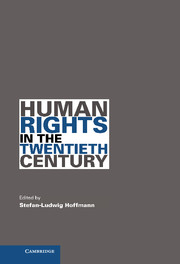Book contents
- Frontmatter
- Contents
- Notes on Contributors
- Acknowledgments
- Introduction: Genealogies of Human Rights
- Part I The Emergence of Human Rights Regimes
- 1 The End of Civilization and the Rise of Human Rights
- 2 The “Human Rights Revolution” at Work
- 3 ‘Legal Diplomacy’ – Law, Politics and the Genesis of Postwar European Human Rights
- Part II Postwar Universalism and Legal Theory
- Part III Human Rights, State Socialism, and Dissent
- Part IV Genocide, Humanitarianism, and the Limits of Law
- Part V Human Rights, Sovereignty, and the Global Condition
- Index
- References
3 - ‘Legal Diplomacy’ – Law, Politics and the Genesis of Postwar European Human Rights
Published online by Cambridge University Press: 05 June 2012
- Frontmatter
- Contents
- Notes on Contributors
- Acknowledgments
- Introduction: Genealogies of Human Rights
- Part I The Emergence of Human Rights Regimes
- 1 The End of Civilization and the Rise of Human Rights
- 2 The “Human Rights Revolution” at Work
- 3 ‘Legal Diplomacy’ – Law, Politics and the Genesis of Postwar European Human Rights
- Part II Postwar Universalism and Legal Theory
- Part III Human Rights, State Socialism, and Dissent
- Part IV Genocide, Humanitarianism, and the Limits of Law
- Part V Human Rights, Sovereignty, and the Global Condition
- Index
- References
Summary
It is somewhat of a paradox that Europe was to become the avant-garde of the international protection of human rights following World War II. No continent had been more severely impacted by the hostilities and atrocities of World War II – and no continent was more to blame for the break out of the conflict. Yet, with the radical reconfiguration of Europe following the war – prompted particularly by the breakdown of empire and the rise of European integration in the context of Cold War politics – Europe was to become the bridgehead of the international protection of human rights. The postwar legal and institutional setup dedicated to the protection of human rights in Europe, today, stands out as one of the most far-reaching and successful attempts at an international human rights protection regime. It has even become the de facto model for developing human rights elsewhere. The original objective was, however, more specific and concerned with saving Europe from its own political and legal ills. It is clear from the debates and negotiations leading to the European Convention for the Protection of Human Rights and Fundamental Freedoms (ECHR) that many regarded the Convention as part of a broader European integration project in which human rights was to be a source of legitimacy and politico-moral commitment. Despite these high ambitions in respect to European integration, the actual reality of the initial development of the ECHR is perhaps better described as the laying down of the cornerstones of what became eventually the much celebrated European human rights system. Certainly, as we now know, the two ‘Europes’ constructed during the postwar period – ‘Europe of the Market’ and ‘Europe of Human Rights’ – have only recently integrated.
It is the general argument of this article that the historical genesis of the European human rights regime was much less straightforward and politically self-evident than most commentators assume today. With the objective of contributing to the historiography of international human rights, the article examines how a continuous and subtle interplay of law and politics structured early European human rights law, and how this was to have decisive effects on both its institutional and legal development. During the period in focus, from the mid-1940s to late 1960s, European human rights law was, to a large extent, marked by the fact that law and politics were not yet differentiated social spheres as in national legal and political systems. This is not to say that early European human rights law was simply a ‘politicised law’ or a ‘legalised politics’, but that the boundaries between these two social fields were blurred. Drawing on the work of Pierre Bourdieu, the subject area can be described as an emerging ‘field’ – that is, a legal field in the course of being constructed and, therefore, mainly relying on preexisting international and national practices. The European Court was, in other words, constructed at the ‘crossroads’ of other preexisting fields, ranging from national law on related matters to national politics and diplomacy. It is against this background that the article argues that European human rights law originally emerged as a form of ‘legal diplomacy’. In contrast to what has been labelled ‘judicial diplomacy’ by ‘legal diplomacy’, the article seeks, more generally, to understand how the development of European human rights, at its early stage, was as much a political process as a legal one. To more concretely analyse this legal diplomacy, the article emphasises the key agents of these developments, the ‘legal entrepreneurs’ who managed to perfection the subtle game of law and diplomacy, defining the playing field of postwar European human rights.
- Type
- Chapter
- Information
- Human Rights in the Twentieth Century , pp. 62 - 82Publisher: Cambridge University PressPrint publication year: 2010
References
- 13
- Cited by



